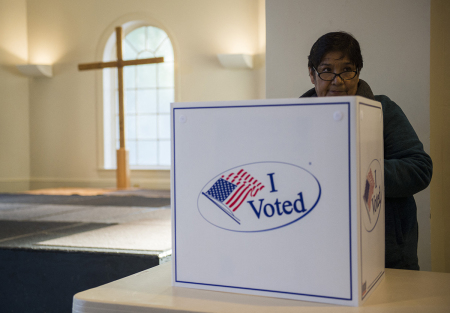Big tech, not gov't overreach, poses biggest threat to religious liberty in 2024 and beyond, legal experts warn

Religious freedom and the ballot box
For Michael Berry of America First Policy Institute, religious freedom and voting are two sides of the same coin.
“It's not just that you have the freedom to believe what you want to believe in America. You also have the freedom to go out and practice that openly and freely,” Berry explained. “And probably the most basic way that we exercise that is through the power of our vote. It's with the power of the vote and the power of the dollar, how we spend our money as well.
“And if you disagree with me, I would just offer you to go visit China and see if they have the same freedom that we have when it comes to their opportunity and choice and who to vote for and how to spend their money.”
While America’s history of religious freedom is often regarded as unparalleled, the application of that freedom in today’s global context raises important questions.
What does that history entail? Is religious freedom the right for everyone to practice their beliefs, regardless of what they are?
"The Anglican Church certainly believed that. Martin Luther certainly believed that. But the people that brought us the First Amendment did not believe that,” said Mike Farris, general counsel for National Religious Broadcasters (NRB) and former president and CEO of Alliance Defending Freedom (ADF). “They believed that religious liberty was for everyone because, again, to whom does the soul belong? It belongs to God, not the government.
“So if the government can dictate Baptist theology to everybody. It could well turn around and dictate Catholic theology to everybody, and that's not religious liberty.”
One of the arguments some Christian conservatives have made against this contemporary notion of religious liberty is that if the Founding Fathers intended for an egalitarian view of religious pluralism, that is, that all belief systems should be recognized as legitimate religions or faith traditions, then at some point, Americans would be forced to recognize all manner of worldviews as “religious truth.”
Pastor John MacArthur of Grace Community Church in Sun Valley, California, is among those pastors who have spoken out against this contemporary notion of religious liberty, specifically in the context of the COVID-19 lockdowns in California, which MacArthur famously defied by keeping his church’s doors open.
“Religious freedom is what sends people to Hell,” he said in a 2022 message. “To say I support religious freedom is to say I support idolatry. It’s to say I support lies, I support Hell, I support the Kingdom of darkness.
“You can’t say that. No Christian with half a brain would say, ‘We support religious freedom.’ We support the truth.”
MacArthur’s views have been confirmed, at least in part, by the rise of secular acceptance of satanism, most notably with The Satanic Temple and its “After School Satan Clubs,” which the group has defended as being protected under the First Amendment.
So does this prove the point that satanism is the inevitable result of egalitarian religious liberty? Not exactly, according to Berry.
“There are court cases where there are court-filed documents in which The Satanic Temple, right, this organization that calls itself The Satanic Temple, has publicly confessed that they're not actually a religious organization,” said Berry. “They don't really have any religious beliefs. Really, they formed this organization as a way to engage in satire, and as a way of poking fun at organized religion.
“And so I would say, at the most foundational level, it's not actually a religious belief, right, or religious organization, The Satanic Temple specifically. And so, anything that they espouse can't really be taken seriously as a religious belief.”
For Berry, any conversation on religious freedom must be consistent with the Founding Fathers’ vision for the United States.
“The Founders were geniuses and they provided a method to change that vision. If that's what the American people want, there's a way to change the legacy that the Founders left us, which is the Constitution of the United States,” he said. “It has an amendment process. And so, change the Constitution. Amend the First Amendment. Revoke the First Amendment.
“If you think you have enough votes to do that, I suspect there will never be enough votes to revoke the First Amendment or to change it.”
Ian M. Giatti is a reporter for The Christian Post and author of BACKWARDS DAD and THE ASSEMBLY ON THE ROCK. He can be reached at: ian.giatti@christianpost.com.





















